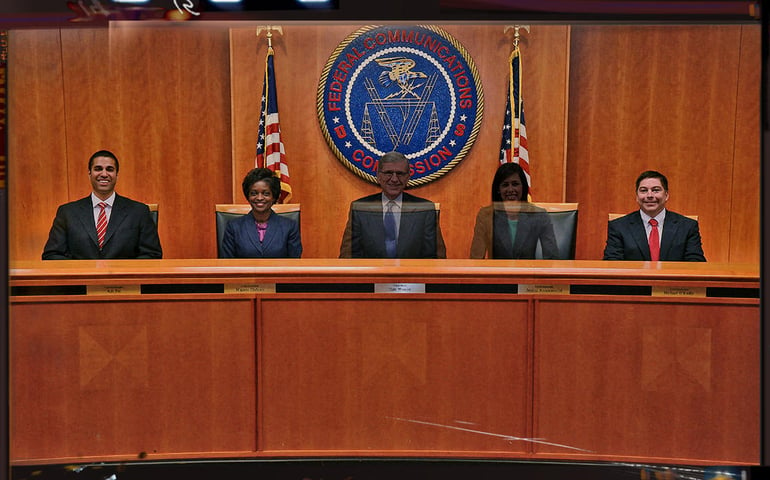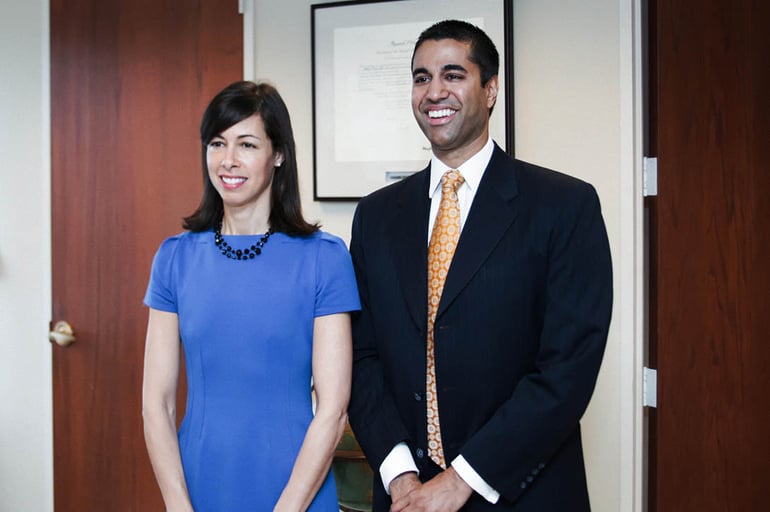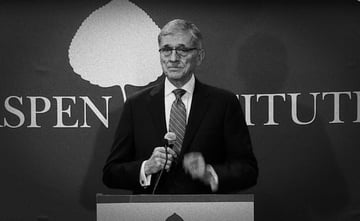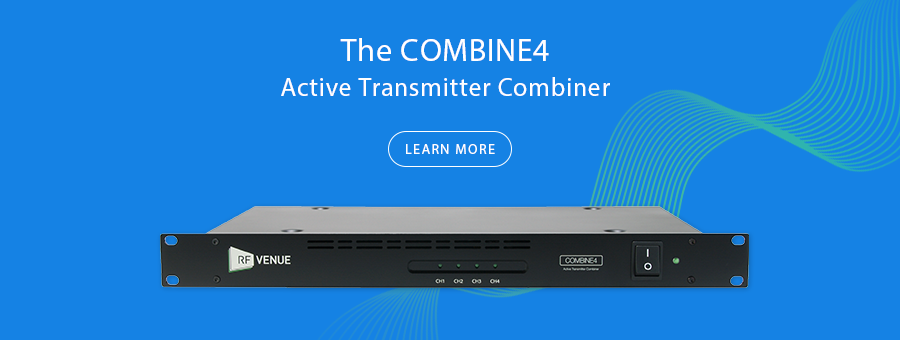- Products
- All Products
- RF PA Extension Kit
- Wireless Microphone Upgrade Packs
- In-Ear Monitor Upgrade Packs
- Wireless Microphone Antennas
- Wireless In-Ear Monitor Antennas
- Antenna Distribution for Microphones
- Antenna Combiners for In-Ear Monitors
- Multi-Zone Antenna Combiners
- Spectrum Tools
- Accessories, Cables and Parts
- Solutions by Venue
- Resources & Training
- Performance Tools
- About Us

Flash Summary
-
Trump appoints Republican Ajit Pai to FCC Chairman. Thus heralds the dawn of a new FCC with a new agenda—though unlike other winners of the Trump appointment wars, Pai is intelligent, thoughtful, and cognizant of the boundaries of law. He has the makings of a leader. Though… time will tell. Net neutrality is likely his first target for destruction, which he opposed. And closing the Digital Divide his first target to build.
-
Democratic Commissioner Jessica Rosenworcel is snubbed of promised re-nomination, and Chairman Tom Wheeler is double-crossed into stepping down. The operational Commission is left with three of five Commissioners: Chairman Pai(R), O'Reiley(R), and Clyburn(D). The two vacancies await nominations, one from each party, by the President, creating a Republican majority at the FCC.
-
Concerning wireless audio and production, we have only Pai's past to examine, but that examination suggests his support for wireless audio is positive, (often in context of his well known advocacy for broadcasting and objection to the Incentive Auctions), or at least will not be any less supportive than Wheeler's FCC.
-
The Incentive Auctions proceed unhindered by these changes.
-
Oh BTW, Trump continues to use personal Android phone for communications as POTUS.
For the American citizen and entertainment production professional both: there are three questions these and forthcoming changes bring to mind.
- What communications policies will a Pai administration wish to create or change?
- What communications policies will a Pai administration actually be able to create or change?
- What does this mean for wireless audio and production?
Answering these questions exceeds the attention span of a single post. I'll begin with Pai, and wireless audio.
Then hopefully find time to cover the acts of political subterfuge which leave us with a 2-1 FCC, the topic of net neutrality (relevant, if you use the internet).
If you have questions, or corrections, comments are just a downscroll away.
A New FCC Rises
They say a police officer can be your best friend or worst enemy.
This familiar but useful aphorism depends on where you are, who you are, and what you've done or plan to do.
In this saying there is a parallel to wireless communications: that, "one operator's signal is another operator's noise."
Depending on who you are, and what you do with communications technology, the FCC is often either your best friend or worst enemy; It is a federal regulatory agency that may judge and meter punishment for abusing U.S. Communications Law (which corporations, citizens, and law enforcement agencies alike abuse with abandon), and makes decisions that may hurt or favor one group over another.
The FCC of 2017-~ will be different from the FCC of 2012-2016.
Therefore, as it creates and executes a new agenda, who is a friend to the new Commission and who is an enemy is likely to change.
Upon what bearing the winds of change may blow we are unsure, but have no want of abundance of intelligent speculation and prophecy.
(Enter Pai)
The biggest verifiable news on the new FCC is the appointment of former leader of former Republican minority (minority of two) Commissioners, Ajit Pai, to the Office of Chairman.

Jessica Rosenworcel (left) and Ajit Pai (right) wait to be sworn in as the two new Commissioners at the FCC headquarters in Washington, DC. May 14, 2012.
For a refresher on the structure of leadership at the FCC, go to the end of this article by clicking this footnote, here.
Ajit Pai's agenda will differ on key issues, especially what is popularly known as "net neutrality." He is now, and after the remaining two nominations, in a position to ask for authority required to execute any reasonable (or who knows? unreasonable) agenda from Congress, unimpeded in the request (execution and fending off legal challenges are other matters), and supported by his Republican majority at the FCC.
Whether Pai will use that power, or make request for more power, I do not know.
However, for those who cringe as Trump appointments roll in: take heart: Ajit Pai is not a reckless, or unintelligent man. At this time, which is admittedly very early on, he is not expected to bow unanimously to special interests and/or pursue a destructive ultra-conservative target at the FCC's authority—not without consideration, at least.
He is more a complicated and human Chairman than that.
Headlines from reputable publications reflect both his complexity and fitness to lead: The Verge published a piece last week titled: Trump’s new FCC chief is Ajit Pai, and he wants to destroy net neutrality. While The Hill hosted an opinion by Georgetown Professor Adonis Hoffman titled Humble Pai one of the best-prepared FCC chairs in history, and makes the categorical statement that:
Incoming Federal Communications Commissioner (FCC) Chair Ajit Pai will rise to the top spot as one of the best prepared and best-liked commissioners in FCC history.
Not "may" rise, but "will."
Wow. Alright, Professor. Let’s wait more than two days before proclaiming Pai a divine prophet, yeah?
The Benton Foundation, a foundation I trust, explains:
Republicans are eager to turn the page at the Federal Communications Commission after eight years of policies under President Barack Obama that they say have stifled innovation and burdened the tech sector. President Trump’s appointment of Ajit Pai as FCC chairman has raised hopes that many of the rules and regulations enacted under President Obama — including the controversial network neutrality rules — will soon be on the chopping block.
Although appointed by Trump, his first actions as Chairman in the last week demonstrate autonomous thought to the contrary; These actions suggest he is not a dog on Trump's leash.
Whether they are sincere, or merely smokescreens to hide insidious intent, we’ll see. They include:
- Voting to provide $170 million to rural residents of New York State to close the Digital Divide, for the Connect America Fund. This is the new FCC's, "first action under Chairman Ajit Pai." (NOTE: Giving taxpayer money to underserved populations is in polar opposition to the Trump Agenda, and even runs parallel to a Democratic broadband objective floated this week, as reported by Eggerton)
- Meeting With Diverse Stakeholders on Digital Divide, again via Eggerton.
- Reappointing veteran engineers Julius Knapp and Gary Epstein, of Incentive Auction Task Force fame, though their contributions and abilities extend far beyond and before the Incentive Auctions. Without these two politically neutral re-appointments, the FCC would lose critical continuity between administrations by way of knowledge of the technology the FCC regulates and in the case of the Auctions, creates. For more: SpectrumTalk.
Although there is strong sentiment (RE: The Verge) Pai will attempt to challenge and roll back the cornerstone accomplishment of Wheeler's administration, the validation of the idea of net neutrality through a 2016 United States Court of Appeals decision upholding the FCC's authority to reclassify broadband as a "service" or utility, through the second Open Internet Order, there are just as many opinions which counter this unfavorable opinion.
If one examines Pai’s record on the Open Internet Orders, which are well argued and thorough, and in may cases, legally correct (i.e. the FCC does not and should not regulate an open Internet through the mechanisms Wheeler and Genachowski proposed in 2010) and aligned with the first two Appellate Court decisions, which struck net neutrality down.
The polarized opinions in the media are, I think, a symptom of the difficulty in separating Pai’s opinion on net neutrality from a lawyerly interpretation of laws; does he oppose the Open Internet Order because he thinks the Genachowski/Wheeler Agenda is illegal or beyond the FCC's authority? Or does he oppose it because of the checks he expects to receive from, say, Verizon (where he worked as a lobbyist), and two or three other people for whom an open Internet is tough for business?
Pai on Wireless Microphones
Pai is a friend to broadcasters. And not just the big ones. As a friend to broadcasters, and opponent of the Incentive Auctions, he is also a friend to wireless microphones.
Although most wireless audio operators I’ve spoken to (thousands) despise the Incentive Auctions, let’s not forget it’s somewhat of a miracle that such a disproportionally small special-interest group was able to get the Federal Communications Commission to not only consider our interests, not only to write about our interests in a NPRM, but actually create new laws to protect our interests in a Report and Order “to accommodate the long-term needs of wireless microphone users.”
The final laws greatly expanded protections afforded to licensed operators, reduced the barrier to entry for licensure, and opened up new spectrum. Part 15 (unlicensed) rules were modified as well, though less favorably for Part 15 users, who account for probably >99.9% of all users. Since most systems sold today are unlicensed, the teeny tiny team of lobbyists from wireless audio manufacturers did not get all they were hoping for, whereas licensed users (Part 74), helmed by a less public, but more effective group, I will not name here, which had a more compelling argument linking the criticality of licensed “low power auxiliary device/services” to the productivity of economic ecosystems of film and broadcast corporations. This argument has significant influence in Washington.
After Pai was appointed on the 23rd, the NAB’s vitriol machine came to a screeching halt and did a U-turn. NAB President and CEO Gordon Smith:
"Without qualification, NAB supports President Trump's selection of Ajit Pai to the position of FCC chairman. Ajit Pai is a known quantity who brings integrity, good humor and a fierce intellect to the Commission. We look forward to working with him and his colleagues on a pro-growth FCC agenda that benefits tens of millions of Americans who rely on free broadcast radio and TV for the most popular content, credible news, and lifeline local emergency alerts."
But as I was saying, Chairman Pai on wireless microphones: his direct words:
Re: Promoting Spectrum Access for Wireless Microphone Operations, GN Docket No. 14-166, Expanding the Economic and Innovation Opportunities of Spectrum Through Incentive Auctions, GN Docket No. 12-268, Report and Order.
STATEMENT OF AJIT PAI
…wireless microphones serve important purposes. They enable broadcasters and other video programming networks to meet the needs of consumers by covering breaking news and other live events. And they are critical tools for businesses and productions across the country.
The upcoming incentive auction will leave substantially less room for wireless microphones. It is therefore critical that we find them new homes. This Order isn’t a perfect solution, but it does adopt a number of rule changes that should help wireless microphones take advantage of additional spectrum bands. I therefore support the Order and am voting to approve.
His statement is 204 words long, but I omit the first 104 words because they are a string of bad jokes and references to Pai’s personal CD collection. He even went to what I am absolutely sure is the unprecedented length of ordering his staff to source and cite the Prince Symbol in a federal document.

This is the most insane thing I can dig up on Pai, and frankly, it's not that insane. If you read around the edges, the 104 word joke lead-in, Prince citation, and more serious final two paragraphs are thinly veiled continuations on his opposition of the Incentive Auctions.
Former Chairman Wheeler’s statement on the same docket (which is much longer and also quoted here only in part), strikes a formal tone and is more of a tightrope:
STATEMENT OF CHAIRMAN TOM WHEELER
...We continue our work to accommodate the long term needs of licensed microphone users by increasing the utility of bands where they already have access and expanding access to other spectrum bands. Added to the steps we took last year to allow more microphone users to become licensed, today’s item solidifies our commitment to address the important needs of microphone users.
No party gets everything it wants in these items. The results of auctioning 600 MHz spectrum means the 600 MHz band operating parameters will be new to everyone after the auction. For this reason, today’s Part 15 item lays out a number of steps that must be taken before unlicensed operations may begin. It also provides common sense procedures that stop harmful interference if it were to occur.
Collectively, the actions we take in these two Orders promote efficient use of our nation’s spectrum resources, address the important needs of the unlicensed and wireless microphone communities, and protect other licensed users in these bands – all of which are critical as we move toward the Incentive Auction next year.
Here is the wisest key sentence from the previous Commissioner’s statement above:
No party gets everything it wants in these items.
A regulation agency, and a Chairman, cannot magically give all stakeholders from all industries the same favor. But they can and should do their best to maximize positive change while minimizing negative fallout.
The U.S. Agency called the FCC can be our best friend, or worst enemy.
A message to the Honorable Chairman Ajit Pai: “Mr. Chairman, let’s be friends.”
*Leading image, modified public domain
Second image:
New FCC Commissioners - Jessica Rosenworcel and Ajit Pai, Public Domain
-
The FCC is helmed by a group of five "Commissioners." Four are Commissioners, while one is Chairman or Chairwoman who has certain powers the other four do not. By law, no Commission may bench fewer than two commissioners of a minority party. The Commission under a Trump administration will be 3/2 Republican/Democrat, to secure a conservative majority. Because Commissioners' (but not extant Chairmen's) terms are six years, not four, two Commissioners from the Wheeler/Obama era remain: Clyburn(D) and O'Reiley(R), and actually Ajit Pai(R) now that I think about it, although he is now Chairman. The Commission awaits a fourth AND fifth nomination from the President, and sloppy uncontested layup confirmations from a Republican Congress.
-
The Open Internet Order, which is the instrument for achieving net neutrality, was upheld by a D.C. Court last year, after the original Open Internet Order was struck down twice (see footnote below). Neither Trump nor Pai can so easily sign some kind of paper to pop that ruling in one go. Rather, he (Pai) must return to the same court which upheld the Open Internet Order less than one year ago, with different evidence arguing the opposite, prepared by the same agency. Rolling back net neutrality is possible, but difficult, and may be perceived by the Federal Appellate Courts as effrontery, and veteran FCC attorneys as burdensome; there are hundreds of lawyers working at the FCC who have labored for ten years to perfect the Open Internet Order(s), and now, how should we expect them to react if they are asked to undue it all in less than four? Pai, is neither blind to this booby-trapped hedge maze, nor numb to the effrontery he will trudge into these esteemed courts, second only to the Supreme Court. If he wishes (and many think he does) or is ordered by Congress to find some way to modify or destroy the Open Internet Order, he will need the best legal minds in the land to do so.
-
It took three attempts in the U.S. Court of Appeals to uphold the Open Internet Order. The first Open Internet Order was a legal sword forged by Chairman Genachowski in 2010, in culmination of formal discussions dating back to at least 2004. It was challenged and struck down in 2010, then wielded and re-framed by Wheeler in 2014, though the meat of most of it was struck down again. It was re-forged as the Open Internet Order of 2015, which was brought before the court and ultimately plunged into the hearts of Circuit Judges by Wheeler on June 14, 2016. This is a good summary.
Alex Milne
Alex Milne was Product Marketing Manager and Digital Marketing Manager for RF Venue, and a writer for the RF Venue Blog, from 2014-2017. He is founder and CEO of Terraband, Inc., a networking and ICT infrastructure company based in Brooklyn, NY., and blogs on spectrum management, and other topics where technology,...
More from the blog

Knowledge Guides
FCC Continues Discussion on UHF White Space for Wireless Mics
3 min read
| December 14, 2014
Read More

Press Release
A Chairman's Farewell
23 min read
| January 25, 2017
Read More

Knowledge Guides
Cross-Industry Coalition Brings Incentive Auction Rulemaking to Screeching Halt Over Concerns About the Duplex Gap
4 min read
| July 17, 2015
Read More
Subscribe to email updates
Stay up-to-date on what's happening at this blog and get additional content about the benefits of subscribing.

